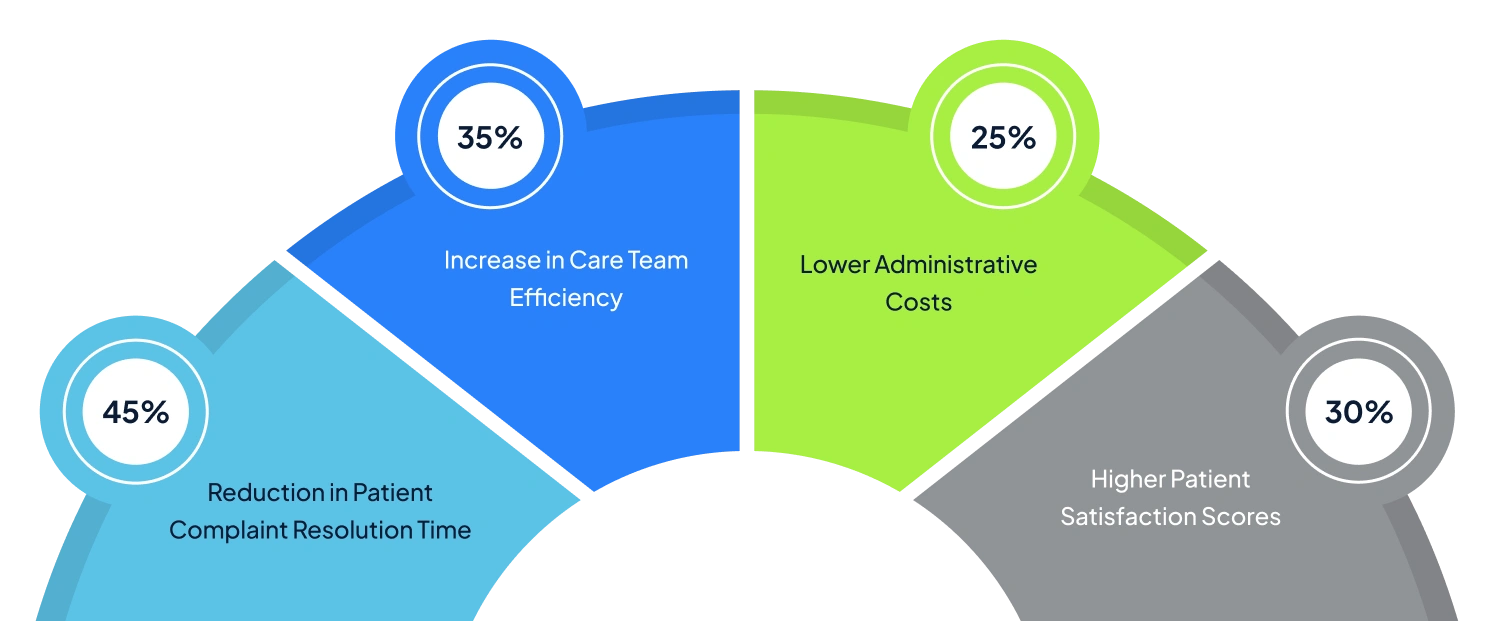The Best Patient Engagement Software
Create strong patient connections, improve health outcomes, and optimize practice efficiency with Patient Engagement Software Solutions from VALiNTRY360.
Transform Your Care Delivery

Patient Engagement Software
Healthcare providers face mounting pressure to improve patient satisfaction scores, reduce readmissions, and enhance care coordination. Patients expect seamless communication through multiple channels, proactive health management support, and personalized care experiences that acknowledge their individual needs. Yet provider organizations struggle with disconnected systems, limited patient engagement capabilities, and increasing demands for better health outcomes while managing constrained resources.
The solution lies in comprehensive patient engagement software that unifies clinical and non-clinical data, automates personalized patient communications, and provides AI-powered patient engagement tools for care teams. Such an approach enables healthcare providers to deliver personalized, proactive patient care across all touchpoints, transforming patient relationships from reactive encounters into continuous engagement partnerships that drive better health outcomes and increased satisfaction. However, achieving this transformation requires specialized expertise in healthcare technology implementation and patient engagement best practices.
Talk to a Patient Engagement ExpertAre These Business Challenges Limiting Your Success?


Reactive Care Instead of Proactive Prevention
Healthcare administrators struggle to identify patients at risk for readmissions, medication non-adherence, or deteriorating conditions before adverse events occur. Without predictive analytics and automated monitoring systems, care teams react to problems rather than preventing them. Top patient engagement solutions with AI-driven risk stratification enable healthcare organizations to see significant reduction in preventable readmissions and improvement in chronic disease management outcomes through proactive patient engagement strategies.


Disconnected Care Teams Without Complete Patient Data
Care teams struggle with fragmented communication systems and siloed patient data that prevent effective collaboration. Healthcare organizations with disconnected patient engagement tools experience 36% higher readmission rates and significantly more duplicate testing. Healthcare professionals report that improving access to integrated patient information would significantly improve care delivery and reduce preventable adverse events.


Patients Excluded from Care Decisions
Healthcare providers face challenges engaging patients as active participants in their care decisions, treatment planning, and outcome discussions. Shared decision-making tools are often lacking, resulting in patients feeling disconnected from their care process. Research shows that patients who actively participate in their care are more likely to follow treatment plans, leading to better health outcomes and reduced hospital readmissions.


Multiple Barriers to Patient Access
Geographic distance, transportation issues, work schedules, and complex appointment processes create significant barriers to patient care access. Healthcare leaders report that access barriers contribute to significant missed appointments and delayed care. Digital patient engagement platforms with telehealth integration, flexible scheduling, and mobile access remove traditional barriers, resulting in improved no-show rates and better care continuity.


Slow Response Times and Limited Self-Service
Patient expectations for immediate response continue to escalate, with 83% of healthcare consumers expecting responses within 10 minutes, while patients prefer resolving simple healthcare questions independently. Improved patient engagement tools can reduce call volume by 40% while improving patient satisfaction scores by 15% through effective self-service options, yet many organizations lack both rapid response capabilities and comprehensive self-service tools.


Inconsistent Communication Across Multiple Channels
Maintaining unified patient communications across phone, email, patient portals, and mobile apps presents significant operational challenges. Organizations lacking integrated patient engagement platforms report significantly higher patient complaints and reduced satisfaction scores due to inconsistent messaging and experience gaps between different communication channels.


Impersonal Patient Care at Scale
Modern patients demand immediate, personalized healthcare communications across all channels while expecting individualized care experiences. Research shows that 68% of patients are more likely to choose a healthcare provider that offers online booking options, yet 79% of patients are more likely to choose providers offering comprehensive digital engagement options. Healthcare systems struggle to provide both immediate responses and customized care plans that meet these elevated expectations.


Poor Patient Health Literacy
Many patients struggle to understand medical terminology, treatment instructions, and care plans, leading to poor medication adherence and suboptimal outcomes. The average American reads at an 8th-grade level, while most healthcare materials are written at a 10th-grade level or higher. Only 12% of the US population is adequately health literate, creating significant barriers to effective patient engagement and medication adherence.


Administrative Burden Overwhelming Staff
Healthcare staff spend excessive time on routine administrative tasks instead of patient care, with administrative activities consuming 30% of healthcare professionals' time. This burden contributes to staff burnout and turnover. Healthcare organizations implementing comprehensive patient engagement platforms report 29% higher staff satisfaction and 24% lower turnover by reducing repetitive tasks and providing tools that enable meaningful patient interactions.


Lack of Real-Time Patient Feedback and Continuous Improvement
Without immediate feedback, issues go unnoticed. Real-time digital surveys and sentiment analysis drive service improvement, strengthen relationships, and enable adaptive, patient-centered care delivery.
Why Choose  for Patient Engagement Software
for Patient Engagement Software

Certified Salesforce Health Cloud Experts
- Our team of certified Salesforce healthcare consultants delivers proven patient engagement strategies specifically designed for hospitals and medical practices, helping practice leaders achieve significant improvements in patient satisfaction scores, care coordination, and health outcomes.
- Among patient engagement software companies, VALiNTRY360 stands out for our deep healthcare expertise, HIPAA-certified team, and proven implementation track record that ensures both technical excellence and regulatory compliance.

Proven Health Cloud Implementation Track Record
- With successful patient engagement implementations across multiple healthcare organizations, we stand as one of the most trusted Salesforce Health Cloud partners, helping clients achieve results like 37% reduction in patient complaint resolution time and 42% improvement in patient portal adoption rates.
- Our patient engagement software solutions consistently deliver measurable outcomes that improve both patient satisfaction and operational efficiency.

Tailored Patient Engagement Solutions
- We architect custom healthcare solutions that address your specific operational challenges, backed by the comprehensive expertise of an experienced, certified, Salesforce-Branded Service Partner with exceptional client retention rates.
- Our digital patient engagement strategies focus on your unique quality metrics and patient care objectives, ensuring that each implementation maximizes the importance of patient engagement in healthcare delivery.
Our Patient Engagement Improvement Services
- Patient Experience Assessment: Evaluate current patient engagement capabilities and identify opportunities for improving patient satisfaction and outcomes
- Digital Patient Engagement Strategy Development: Create strategic patient interaction roadmaps aligned to quality improvement goals and HEDIS measures
- Care Coordination Technology Alignment: Ensure platform integration across clinical, administrative, and patient-facing systems to improve continuity of care
- Patient Communication Automation: Streamline patient outreach with proven workflows that reduce response time by 30% and increase engagement rates
- Patient Portal Implementation: Deploy secure, user-friendly portals that empower patients and reduce administrative burden on staff
- Care Journey Mapping: Optimize patient touchpoints for seamless experiences across the entire care continuum
- AI-Powered Patient Insights: Implement predictive analytics that identify at-risk patients and enable proactive interventions through AI patient engagement technologies
- Cross-Cloud Integration: Connect Health Cloud with Service Cloud and Marketing Cloud for unified patient engagement
- EHR System Connection : Integrate electronic health records and clinical systems for comprehensive patient views
- Remote Monitoring Integration: Connect patient monitoring devices and telehealth platforms for continuous care oversight
- Patient Engagement Monitoring: Track quality metrics and generate automated patient satisfaction reporting with advanced measurement tools for patient engagement
- Care Process Refinement: Implement proven methods that drive significant improvement in patient experience scores through data-driven patient engagement strategies
- Staff Training and Enablement: Provide comprehensive training that accelerates platform adoption and patient care excellence
Technical Expertise and Platform Architecture
Our Salesforce Health Cloud team specializes in healthcare-specific patient engagement platforms that scale efficiently. Healthcare organizations implementing strategic patient engagement tools report 32% faster problem resolution and 28% improvement in care team productivity according to Salesforce’s Healthcare Customer Success Metrics.
Our integration capabilities connect patient systems with clinical workflows for seamless care delivery, implementing proven patient engagement technologies that result in 37% higher patient retention rates through automated care coordination and integrated omnichannel patient engagement communications. As one of the leading patient engagement solution companies, we combine technical expertise with healthcare know-how and HIPAA certification to deliver exceptional outcomes while maintaining the highest standards of patient data security and regulatory compliance.
Our Patient Engagement Improvement Process
We follow a structured, four-step methodology designed to maximize Salesforce success. From initial discovery to long-term support, our process ensures alignment with your business goals, seamless execution, and continuous optimization for sustainable growth.

Step 1:Assessment and Discovery
- Comprehensive analysis of current patient engagement processes and satisfaction metrics
- Documentation of patient experience pain points and care gap opportunities
- Healthcare technology infrastructure evaluation and optimization planning
Step 2: Solution Design and Roadmap
- Health Cloud architecture planning with compliance and scalability considerations
- Custom patient workflow and care automation blueprint development
- Patient self-service strategy and portal design planning
Step 3: Implementation and Integration
- Accelerated Health Cloud configuration and customization
- Seamless integration with EHR systems and clinical applications
- Comprehensive testing with HIPAA compliance validation led by our HIPAA-certified team ensuring all patient data handling meets the highest regulatory standards
Step 4: Training and Continuous Improvement
- Care team and administrator training programs
- Patient engagement optimization and analytics configuration
- Regular performance reviews with quality metric enhancement recommendations
Key Benefits of VALiNTRY360's Patient Engagement Improvement Solutions


Wherever you go, we’re already there
Providers We Serve
VALiNTRY360 accelerates business performance through Patient Engagement Software solutions across multiple industries:

Primary Care Physicians
Automate care with reminders, chronic tracking, and secure messaging to improve prevention, adherence, coordination, and physician-patient relationships efficiently.

Specialty Medical Practices
Use condition-specific tools for tracking, follow-ups, and treatment protocols that boost care continuity, appointment adherence, and patient outcomes effectively.

Mental Health Practices
Ensure secure communication and compliant workflows to support therapeutic relationships, privacy, and consistent engagement across all behavioral health care touchpoints.

Research & Clinical Trials
Streamline recruitment, communication, and data collection with integrated platforms that improve patient experience while ensuring full regulatory and research compliance.

Urgent Care Centers
Accelerate care delivery using automated check-ins, wait-time updates, and coordinated follow-ups to improve patient flow and experience significantly.

Multi-Location Health Systems
Unify patient communications and portal access across locations to ensure consistent experiences and improve quality metrics system-wide at scale.

Ambulatory Surgery Centers
Deliver automated education and recovery workflows to improve surgical prep, reduce post-op complications, and enhance satisfaction through better patient engagement.

Telehealth Providers
Enhance virtual care through scheduling, remote monitoring, and secure messaging for seamless, satisfying telehealth experiences that match in-person quality.
In Their Own Words: Customer Success Story
Get Started with 
Partner with proven patient engagement experts who deliver the best patient engagement software solutions in the healthcare industry:
FREE Initial Consultation
Speak with experts on patient engagement and priorities.
Custom Patient Engagement Blueprint
Get a tailored roadmap for measurable engagement success.
Rapid Implementation
Quickly deploy solutions that improve outcomes and satisfaction.

Smarter Engagement, Bigger Results
Healthcare organizations ready to transform patient relationships and improve clinical outcomes partner with VALiNTRY360's certified Health Cloud consultants. Our proven implementations help medical practices achieve significant improvements in patient satisfaction, care coordination, and operational efficiency while reducing administrative burdens.
The Best Patient Engagement Software FAQ by
Patient engagement refers to the collaboration between patients and healthcare providers in managing health and care decisions. It encompasses patients’ active participation in their healthcare journey, from preventive care and treatment decisions to ongoing health management. Effective patient engagement involves informed patients who understand their conditions, participate in shared decision-making, and take ownership of their health outcomes.
Patient engagement in healthcare is the practice of involving patients as active partners in their care. This includes accessing and using health information, communicating with providers, following treatment plans, and participating in care decisions. It transforms the traditional doctor-patient relationship from a passive model to an active collaboration where patients feel empowered and invested in their health journey.
Patient engagement software is digital technology designed to enhance communication and interaction between healthcare providers and patients. These platforms typically include patient portals, appointment scheduling tools, secure messaging systems, health education resources, medication reminders, and remote monitoring capabilities. The best patient engagement software integrates with existing EHR systems to provide comprehensive care coordination.
Patient engagement is crucial because it:
- Improves health outcomes and reduces readmissions
- Increases patient satisfaction and loyalty
- Enhances medication adherence and follow-up care
- Reduces healthcare costs through better prevention
- Strengthens the patient-provider relationship
- Supports value-based care initiatives
Research shows that patients with higher engagement levels experience significantly better health outcomes and lower healthcare costs.
Absolutely. Studies consistently demonstrate that patient engagement improves clinical outcomes. Engaged patients are:
- Three times more likely to follow treatment plans
- 20% more likely to receive preventive care
- 30% more likely to manage chronic conditions effectively
- Experience 15% fewer hospital readmissions
The importance of patient engagement in healthcare is evident in these measurable improvements to patient care quality and cost effectiveness.
To increase patient engagement:
- Start with education: Provide patients with easy-to-understand information about their conditions
- Enable digital access: Implement patient portals and mobile apps for 24/7 healthcare access
- Personalize communications: Tailor messages based on patient preferences and health status
- Encourage participation: Involve patients in care planning and decision-making
- Simplify processes: Make appointment scheduling, prescription refills, and follow-ups convenient
Improving patient engagement requires a comprehensive approach:
- Implement digital patient engagement platforms that provide secure communication channels
- Train staff on patient-centered communication techniques
- Use data analytics to identify patients at risk of disengagement
- Create patient engagement strategies that address specific population needs
- Measure patient engagement regularly and adjust approaches based on feedback
Empowering patients to engage in their own healthcare involves:
- Educational resources: Providing accessible health literacy tools
- Self-service options: Enabling patients to manage appointments and access records
- Goal setting: Helping patients establish and track health objectives
- Technology tools: Offering patient engagement apps and wearable device integration
- Support systems: Creating patient communities and support groups
Effective patient activation strategies include:
- Personalized care plans based on individual health needs and preferences
- Motivational interviewing techniques to encourage behavior change
- Gamification elements to make health management more engaging
- Peer support programs connecting patients with similar conditions
- Regular check-ins through various communication channels
Patient engagement improves outcomes through several mechanisms:
- Better adherence to medications and treatment plans
- Earlier intervention when patients understand warning signs
- Improved health literacy leading to better self-management
- Stronger patient-provider relationships facilitating open communication
- Proactive care management rather than reactive treatment
Improving patient engagement requires a multi-faceted approach combining technology, communication, and personalization. Key strategies include implementing digital patient engagement tools, training staff in patient-centered communication, creating personalized care experiences, and measuring engagement effectiveness through patient feedback and outcome metrics.
Patient portals enhance engagement by:
- Providing 24/7 access to health information and provider communication
- Enabling convenient scheduling and prescription management
- Facilitating secure messaging between patients and providers
- Offering health education resources tailored to patient conditions
- Supporting care coordination across multiple providers
- Improving health literacy through interactive tools and resources
Innovative technology approaches include:
- AI-powered chatbots for instant health information and appointment scheduling
- Virtual reality for patient education and therapy
- Wearable device integration for continuous health monitoring
- Telemedicine platforms with interactive features
- Mobile health apps with gamification and social features
- Predictive analytics to identify at-risk patients proactively
Virtual assistants enhance patient engagement by:
- Providing immediate responses to common health questions
- Sending automated medication and appointment reminders
- Collecting patient-reported outcomes between visits
- Offering 24/7 support for routine inquiries
- Facilitating appointment scheduling and cancellations
- Delivering personalized health education content
Patient engagement can be measured through:
- Patient activation scores using validated assessment tools
- Portal usage metrics including login frequency and feature utilization
- Communication engagement tracking secure messages and response rates
- Appointment adherence monitoring no-show rates and cancellations
- Patient satisfaction surveys measuring experience and loyalty
- Health outcome indicators such as care plan adherence and preventive care utilization
Clinical trial patient engagement improves through:
- Digital enrollment platforms simplifying participation
- Mobile apps for data collection and communication
- Virtual visits reducing travel burden
- Patient advisory boards involving participants in trial design
- Transparent communication about trial progress and results
- Gamification elements to maintain long-term participation
VALiNTRY360 stands out through:
- Salesforce Health Cloud expertise with deep healthcare domain knowledge
- HIPAA-certified consultants ensuring regulatory compliance
- Proven implementation track record across diverse healthcare settings
- Customized patient engagement solutions tailored to specific organizational needs
- Comprehensive training and support for sustainable adoption
- Integration capabilities connecting multiple healthcare systems seamlessly
Our platform differentiates itself by offering:
- AI-powered patient insights for proactive care management
- Omnichannel patient engagement across all communication preferences
- Real-time analytics for measuring engagement effectiveness
- Scalable architecture growing with your organization
- Pre-built healthcare workflows reducing implementation time
- Expert healthcare consultants guiding best practices throughout
Organizations typically see:
- 40% reduction in patient complaint resolution time
- 35% improvement in care team efficiency
- 30% increase in patient satisfaction scores
- 25% decrease in administrative costs
- 37% improvement in patient portal adoption rates
- Measurable reductions in readmissions and no-show rates
We ensure sustained success through:
- Ongoing optimization based on performance analytics
- Regular training updates for staff and administrators
- Continuous platform enhancements incorporating latest healthcare trends
- 24/7 technical support for seamless operations
- Strategic consulting for evolving patient engagement strategies
- Best practice sharing from our extensive healthcare client network
Contact us today to schedule your FREE patient engagement consultation and discover how we can help you achieve measurable improvements in patient satisfaction, care quality, and operational efficiency.

 for
for 
